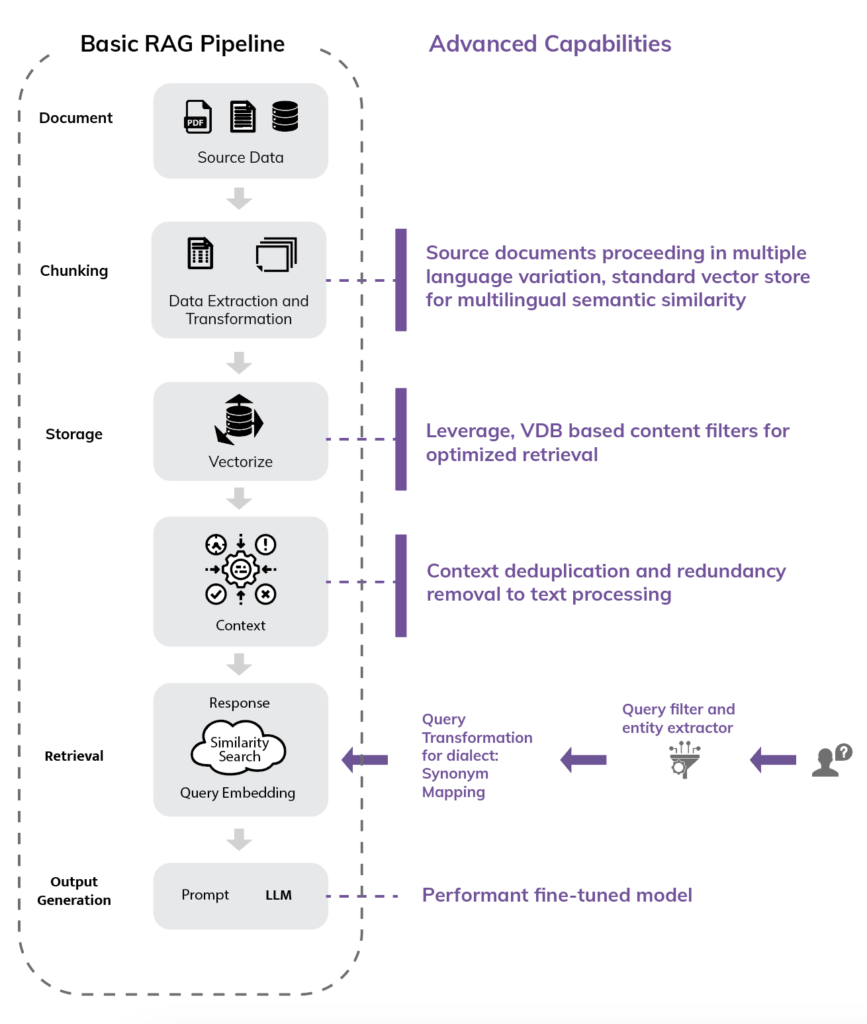Viamo’s multilingual conversational assistant can answer any question in the farming domain, through basic phones without the Internet.

Viamo is a social benefit corporation that provides underserved populations access to information to improve businesses, governance, health, and education using IVR-based pre-recorded messages. For quite some time, they have been exploring the potential of Generative AI to transform the way they engage with their users, and enable them to ask questions and receive accurate answers in their own language on topics such as farming, financial services, and family planning.
The Importance of Being Local
Today, Viamo’s multilingual dial-in agricultural information voicebots, which are expected to enable farmers in Kenya and Bihar (India) to ask questions in their own languages, helping them to improve their agricultural practices, income, and overall well-being.
The motivation behind developing such a voicebot, that is both multilingual and equipped with domain-specific expertise, is to provide tailored support to smallholder farmers’ unique needs, as illustrated below:
Kiswahili: Ninawezaje kudhibiti uvamizi wa wadudu?
(English: How do I manage a pest infestation?)
Hindi: मैं अपना कृषि उत्पादन कैसे बढ़ाऊं?
(English: How do I increase my farm production?)
The Background
Globally, there are more than three billion people who are Internet-disadvantaged or disconnected from the world wide web. There are communities which have minimal access to timely and critical information. For communication, they are limited to the voice capabilities of basic phones, and a desire to be connected with the outside world. This chasm underscores a significant gap in dissemination of critical information using the current distribution and consumption channels.
Viamo and Sahaj Software joined hands to explore applications of GenAI in the information dissemination space. And together Viamo and Sahaj secured funding to develop the farmers’ digital assistant.
The Problem Statement
Viamo and Sahaj aimed to design and launch a conversational omnichannel digital assistant catering to smallholder farmers. The objective was to create a voice-interfaced conversational application MVP, designed to reach underserved populations, that provides information to agriculture questions specific to two geographies: Kenya (Kiswahili) and Bihar, India (Hindi). Integrating AI into the solution meant that the team would have to solve the below challenges:
- How to generate hallucination-controlled response for specific use cases: General response generation from LLM suffers from factual incorrectness, which requires drawing boundaries by restricting the knowledge resource used for the responses.
- How to contextualize responses for tone, terminology, seasons, and geography: One of the primary challenges was ensuring that responses were culturally relevant. The system had to cater to the needs of a farmer in a particular location and adapt responses based on their tone and other regional nuances.
- How to measure and ensure response accuracy: It was crucial to measure and ensure response accuracy, as any incorrect or ambiguous response could have catastrophic consequences on this populace, especially for underserved populations relying on the system for critical information.
- How to use multilingual source documents: A major hurdle involved the use of multilingual source documents, which adds complexity to the retrieval process. The model must be able to understand and retrieve information from diverse languages while maintaining the quality and relevance of the responses.
- How to minimize retrieval costs while maintaining response quality: The system needed to minimize the costs associated with retrieving and generating responses without sacrificing response quality.
- How to identify off-topic queries: It was a challenge to identify and filter off-topic queries, ensuring the model remains focused on the relevant domain.
Solutioning the MVP
Keeping the above challenges in mind, Viamo and Sahaj developed a solution, which featured the following:

The main output was two completed Q&A pipelines and language models supporting text-based questions (one in Kiswahili and one in Hindi). The Q&A pipelines were integrated with the Viamo Cloud platform with the assistance of the Viamo team.
Impact of this Innovative Solution
By enhancing the RAG pipeline with custom features, Sahaj made it production-ready for reaching underserved populations through intelligent, voice-interfaced applications. The impact of this system is manifold:
- By providing geographically relevant responses, the application greatly expanded its ability to cater to diverse user needs, especially in underserved regions.
- The multilingual capabilities of the system also enhanced its accessibility, making critical information more available to users who speak languages that are often underrepresented in mainstream systems.
- The continuous monitoring of the system’s response quality, particularly regarding relevance, accuracy, and verbosity, built confidence amongst smallholder farmers and stakeholders, reinforcing the system’s reliability in high-stakes environments.
- This solution helped farmers gain access to information through basic phones without the Internet.
Viamo’s commitment to providing critical information to underserved populations was instrumental in shaping this conversational assistant, which works over text and WhatsApp with a focus on voice first. Viamo’s teams made several trips to meet local farmers in Kenya and Bihar to better understand the user base and explore how they can seamlessly connect with the solution, ensuring its adaptability. Their collaborative efforts enhanced the robustness, accessibility, and penetration of this innovative solution within the agricultural community.



